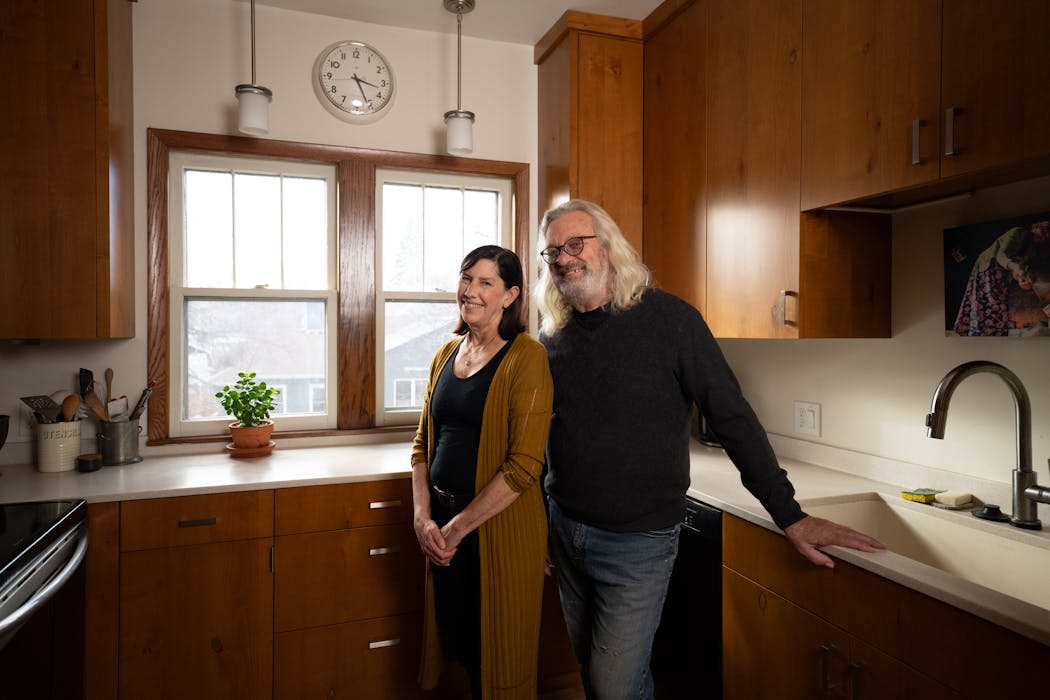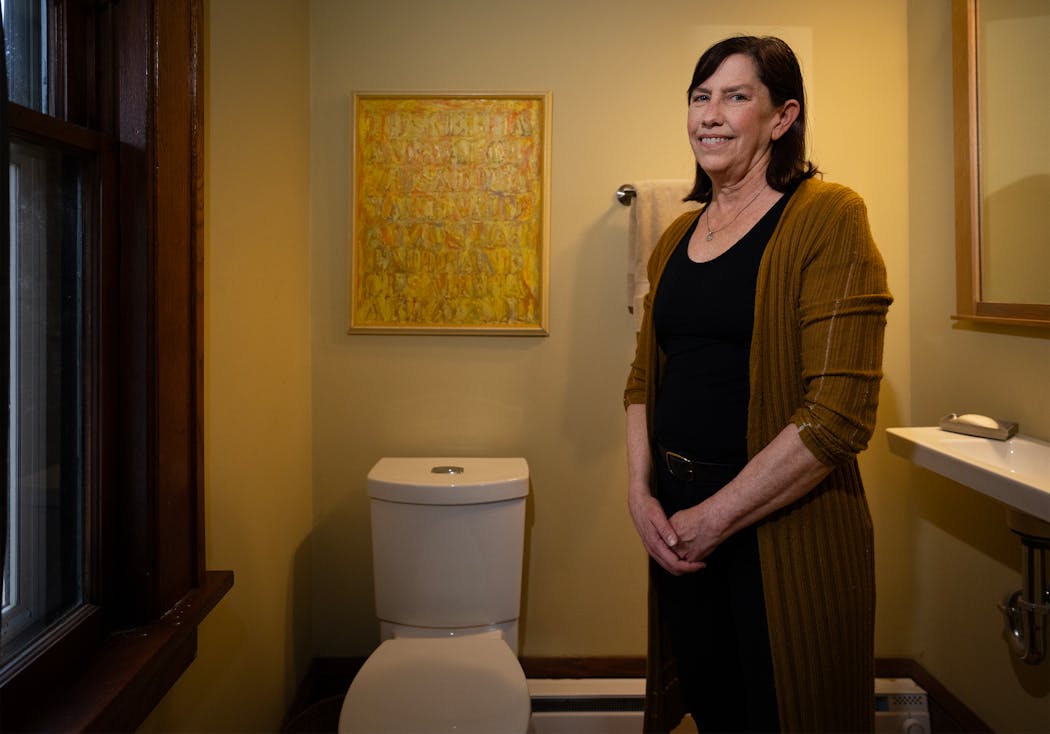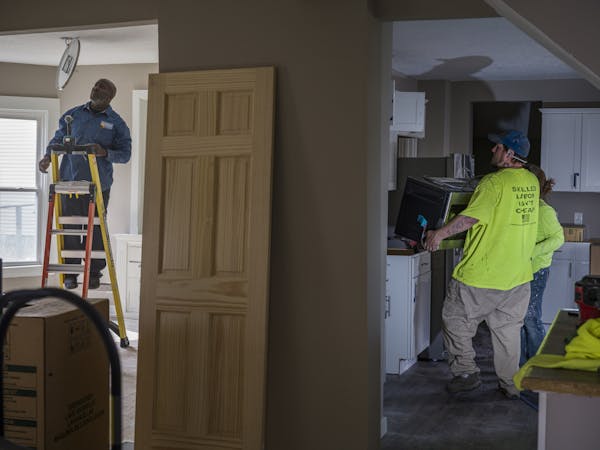Busy raising three children, Denise and Steve Renner hadn't made many home improvements in the 30 years they lived in their house in White Bear Lake Township.
So, when they were ready for a refresh, they decided to tackle areas used the most and that needed the most updating, including the kitchen, exterior siding and the parlor-cum-office. Overall, they invested about $75,000, which is the amount Denise Renner, 57, hopes to recoup some day.
"We plan to be here and want to enjoy it," she said. "When we do want to move, the resale value will be huge."
Since the pandemic, consumers like the Renners have been on a spending spree to make their homes more comfortable and functional. Experts say higher mortgage rates may prompt more people to renovate if they plan to stay in their home longer. Furthermore, older adults tend to live in older units that need more work.
Harvard University's Joint Center for Housing Studies projected U.S. homeowners and renters would spend a record $580 billion on home remodeling this year. Adults age 55-plus account for more than half of all spending on home improvements, said Abbe Will, senior research associate at the center.
Whether you plan to stay in your home another decade or sell it soon, you may want to consider which improvements bring the biggest bang for the buck before undertaking pricey projects. It's called return on investment (ROI), which is how much of your initial cost you'll recover from a higher home value and asking price when you sell it.
The average ROI across all improvements is 60% to 70%, with interior projects usually bringing higher returns than exterior ones. In general, more upscale and extensive renovations and work involving electrical, plumbing or structural engineering, such as moving walls, mean a higher cost and lower return.
Kitchen and bathroom redos always top the ROI list at resale because they're expensive projects that new homeowners typically don't want to tackle, said Natasha Cejudoof Lake Sotheby's International Realty in Minneapolis and a real estate agent for nearly 20 years. Smaller, less expensive improvements, such as new landscaping and painting, also may heighten a home's curb appeal and have a "magic" effect on ROI, she added.
Many older consumers or those planning ahead may want to upgrade or install features for accessibility and safety, including a curbless shower or higher toilet in the bathroom, lower cabinets in the kitchen, better lighting or home automation.
"For the 50-plus, it's not strictly about renovation but accessibility as well," said contractor Bong Xiong,owner of Next Gen Construction & Remodeling in North St. Paul. "If you're doing a full redo, why not start thinking about adding accessibility features?"
Consider these six home improvements for the biggest bank for your buck:
The kitchen
A full kitchen remodel can cost up to $70,000. Homeowners may see a 75% return on a complete remodel or 67% on a kitchen upgrade. Popular kitchen renovation features include countertop upgrades, bigger islands, cabinets painted bold colors, a beverage station and new appliances.
Cabinets often are the most expensive part of a kitchen redo, but just cabinet refacing, new hardware and repainting is $7,000-$10,000, said Emily Korf, an interior designer and co-owner of Kitchen Refresh in St. Paul. Upgrades that people 50-plus often opt for include slide-out shelves for bulky items like big pots, at a cost of about $120 per shelf, said co-owner and husband Bill Korf.
"Instead of ripping out all of the kitchen cabinets, which are solid oak, we left the base and repainted them," Denise Renner said of her $30,000 kitchen redo. "That saved us a significant amount of money."
The Korfs also see more requests to remove built-in desks in kitchens and replace them with a beverage station and more storage space, Emily Korf said. The cost is about $1,000 to $1,500, Bill Korf said.
As part of a kitchen update, Pat and Stephanie Duval of Woodbury ripped out their little-used desk and added a beverage fridge, wine holder and counter to hold coffee supplies, which they use all the time.
Two big trends involve kitchen islands: extending an existing island to serve as a dining area and painting the base a statement color like green. If your kitchen is large enough, consider adding an island.
Most homeowners — and buyers — want stone countertops, such as granite or quartz, but contractor Xiong said butcher block counters are "making a comeback" for a warm, wood look.
The bathroom
Bathroom renovations will cost from about $5,000 to over $100,000. Depending on the materials and extent of work, consumers will see a return of 23% to 71%. If you have a home with only one bathroom, consider adding another one, even if it's a powder room, Cejudo said, to increase resale value.
Adding a second bathroom was a must when Suzy Ahrens' family downsized two years ago and moved into a duplex they owned in St. Paul. "We added a half bath where a little sewing room was," Ahrens, 58, said. "We needed the bathroom done because we have a 16-year-old daughter."
The biggest trend, however, remains replacing tubs with walk-in showers, which can help older adults age in place, for $8,000 or more. Other popular, less expensive upgrades include adding a vent or a steam shower.
As part of a bathroom remodel, the Duvals removed a deep jacuzzi tub, replacing it with a walk-in shower and a free-standing tub. "It worked out great when the kids were little," Stephanie Duval said about the old tub. "We just didn't have a need for that anymore."
Refinish hardwood floors
Refinishing hardwood floors costs $2 to $7 per square foot, but it generates the highest return, at 147%. Even installing new wood floors brings a 118% return.
"Our floor is maple, so we didn't rip up the floor; it was stripped and re-stained," Renner said of her kitchen refresh. She chose a darker stain, which she thinks complements new light gray cabinets and blue-gray walls.
Painting
Paint is a relatively inexpensive way to refresh a home's interior or exterior.
"The exterior is the first thing people see" and it's "what will sell your house," said Xiong, who also is a real estate agent.
New exterior paint will enhance curb appeal and potentially resale value. The cost can run from $2,000 to much higher depending on the size of your house and whether you make it a DIY project or hire out the work.
Inside, a light, neutral tone throughout is popular, but accent walls also are returning. According to the home improvement site Angi, the average cost is $2.75 to $4.70 per square foot.
Replace siding
Updating your home's siding is another improvement with high curb appeal. It can cost $6,000 to $20,000, but homeowners will see an 86% return for fiber cement siding and 82% for vinyl siding.
New windows
Upgrading windows not only adds curb appeal but usually is more energy-efficient, too. New windows fit better, reducing drafts that can drive up heating and cooling bills. This may cost $20,000 to $25,000 or more, depending on the number and type of windows, but the return ranges from 61% to 69%.
Landscaping
Beautifying your property, especially the front yard, is another low-cost improvement that enhances curb appeal. Costs range from hundreds of dollars to $4,000 or more to add structures like a fence.
While money matters, the bottom line for many people is more intangible: It's called happiness.
After a renovation, 84% of consumers wanted to spend more time in their home and 69% experienced greater enjoyment in their home, according to a report by the National Association of Realtors and National Association of the Remodeling Industry. The realtors group even calculates a Joy Score for home renovations, including repainting and refinishing/installing wood floors, both with a perfect 10.
"We are planning to stay," Pat Duval said of his Woodbury home. "You want to get your money back on it someday, but you want to enjoy it, too."

The 5 best things our food writers ate this week

A Minnesota field guide to snow shovels: Which one's best?

Summer Camp Guide: Find your best ones here

Lowertown St. Paul losing another restaurant as Dark Horse announces closing




